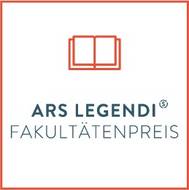


The Ars Legendi Faculty Prize for Mathematics and Natural Sciences is awarded for the categories of biosciences, chemistry, mathematics and physics and is awarded to people who have distinguished themselves through outstanding, innovative and exemplary achievements in teaching, advice and support at the university.
The prize is endowed with 5,000 euros for each category. The awardees are the Stifterverband für die Deutsche Wissenschaft, the German Mathematical Society, the German Physical Society, the German Chemical Society and the Association for Biology, Biosciences & Biomedicine in Germany.

Dr. Sabrina Gensberger-Reigl from Friedrich-Alexander University Erlangen-Nuremberg supports a smooth transition from university to industry with her two-semester, practice-oriented seminar in the food chemistry university courses . She thus makes a significant contribution to students' career orientation. Project work in small groups fosters important skills.
| 2025 | Chemistry | Sabrina Gensberger-Reigl, Friedrich-Alexander University Erlangen-Nuremberg |
| physics | Sebastian Schellhammer, Technical University of Dresden | |
| mathematics | Jörg Härterich, Ruhr University Bochum | |
| Life Sciences | Benedikt Heuckmann, University of Münster |
| 2024 | Chemistry | Hans-Christian Schmitt, Julius-Maximilians-University Würzburg |
| physics | Jan-Philipp Burde, University of Tübingen | |
| mathematics | Anselm Knebusch, Stuttgart University of Applied Sciences | |
| Life Sciences | Nina Keul, Christian-Albrechts University of Kiel |
| 2023 | Chemistry | Sebastian Seiffert, Johannes Gutenberg University Main |
| physics | Ivonne Möller, Ruhr University Bochum | |
| mathematics | Claudia Kirch, Otto von Guericke University Magdeburg | |
| Life Sciences | Holger Schielzeth, Friedrich Schiller University Jena |
| 2022 | Chemistry | Nele Milsch, Georg-August University of Göttingen |
| physics | Julia Sammet, Goethe University Frankfurt aM | |
| mathematics | Martin Schlather, University of Mannheim | |
| Life Sciences | Dagmar Hann, Ludwig Maximilian University of Munich |
| 2021 | Chemistry | Olalla Vásquez, University of Marburg |
| physics | Christian Hoffmann, Saarland University | |
| mathematics | Brigitte Forster-Heinlein, University of Passau | |
| Life Sciences | Katrin Meyer, University of Göttingen |
| 2020 | Chemistry | Dirk Burdinski, Cologne |
| physics |
Heidrun Heinke, Aachen Sebastian Staacks, Aachen Christoph Stampfer, Aachen |
|
| mathematics | Ulrich Kortenkamp, Potsdam | |
| Life Sciences | Martin Wilmking, Greifswald |
| 2019 | Chemistry | Lena Daumann, Munich |
| physics | Burkhard Priemer, Berlin | |
| mathematics | Robert Rockenfeller, Koblenz | |
| Life Sciences | Markus Pietrowski, Bochum |
| 2018 | Chemistry | Klaus Lehmann, Bonn |
| physics |
Bernd-Uwe Runge, Konstanz Philipp Möhrke, Konstanz |
|
| mathematics | Leif Döhring, Mannheim | |
| Life Sciences | Frank Sprenger, Regensburg |
| 2017 | Chemistry | Christian Ehli, Erlangen-Nuremberg |
| physics |
Claudia Schäfle, Rosenheim Silke Stanzel, Rosenheim Elmar Junker, Rosenheim |
|
| mathematics | Sven de Fries, Trier | |
| Life Sciences | Jorge Groß, Bamberg |
| 2016 | Chemistry |
Richard Göttlich, Gießen Nicole Graulich, Gießen Siegfried Schindler, Gießen |
| physics | Frederic Schuller, Erlangen-Nuremberg | |
| mathematics | Ilka Agricola, Marburg | |
| Life Sciences | Dorothea Kaufmann, Heidelberg |
| 2015 | Chemistry | Dietmar Stalke, Göttingen |
| physics |
Bernd Jödicke, Konstanz Jürgen Sum, Konstanz |
|
| mathematics | Norbert Henze, Karlsruhe | |
| Life Sciences |
Simone Karrie, Braunschweig Reinhard Köster, Braunschweig Martin Korte, Braunschweig |
| 2014 | Chemistry | Thorsten Daubenfeld, Idstein |
| physics | Christian Wagner, Saarbrücken | |
| mathematics | Daniel Grieser, Oldenburg | |
| Life Sciences |
Dominik Begerow, Bochum Jens Wöllecke, Bochum |
The jury, chaired by the president of the specialist society that oversees the award in the respective year, is composed of:
One student representative per specialist society
One expert from the university for each professional society
One representative per sponsor
A university didactic specialist (selected by the Stifterverband für die Deutsche Wissenschaft)
The GDCh sends the following representatives to the jury:
A member of the JCF national board or a JCF regional spokesperson as student representative
The ADUC chairman as university experts
This page has been machine translated. If you have any feedback or comments please feel free to contact us. 
last modified: 26.03.2025 11:59 H from Translator